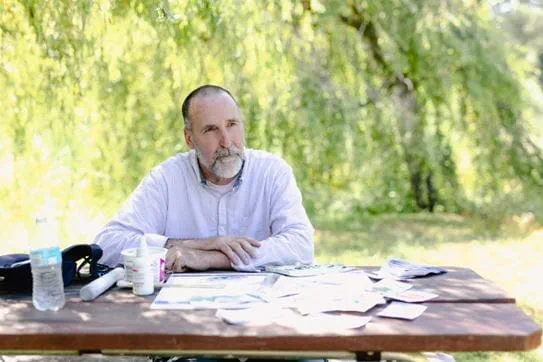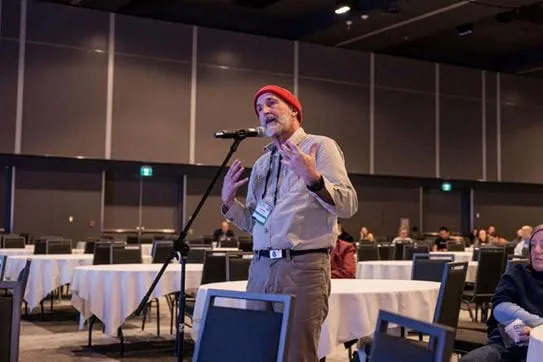A male breast cancer diagnosis
Most men don’t expect to be living with breast cancer. But when Angus Pratt started showing signs, he had enough experience with the disease to understand what was happening.
“My brother had male breast cancer and my mother died of breast cancer, so I was pretty confident I knew what the lump on my breast meant,” Angus shares.
It’s estimated that in 2024, 260 men were diagnosed with breast cancer in Canada.
In 2018, Angus was diagnosed with breast cancer and had a bilateral mastectomy later that year, followed by tumour-inhibiting medication. Around this time, Angus was also diagnosed with lung cancer. For this, he received chemotherapy, radiation and immunotherapy. When the lung cancer progressed, his doctors switched him to targeted therapy.
"I count my blessings every day. I'm stable and I’ve made it farther than even my family doctor thought I would," Angus says.

Angus' Run for the Cure
Although walking was a regular part of his routine, Angus noticed that he hadn’t returned to his previous fitness levels. Interested in running as an activity, Angus decided to participate in the Canadian Cancer Society CIBC Run for the Cure in October 2020.
“I needed the motivation, and when I looked up that year’s event, I discovered it was going to be virtual which seemed easy enough. So, I signed up,” Angus says.
Angus has participated in the run 4 times since then, and plans to participate in future years. On Run Day, Angus is often asked which woman in his life he is running for. It became an opportunity to explain that breast cancer is something that affects men too.
When people asked me which woman I was running for in the Canadian Cancer Society CIBC Run for the Cure, I told them I was a survivor, that men get breast cancer too and should also be checking their breasts for lumps. There may only be around 260 men diagnosed with breast cancer a year in Canada, but it’s a message that still needs to get out there.
Becoming an advocate for the cancer cause
Living with breast and lung cancer, Angus decided that he wanted to give hope and help to others who have also been affected by cancer. One way was to become an active member of CancerConnection, the Canadian Cancer Society’s (CCS) online support community. He started answering questions, giving advice and providing support for grief.
I’m pretty frank about the fact that I have an expiry date. There’s not a lot of options for me. The medication will stop working one day, and that gives me another perspective on cancer where it makes me want to dig in and help others. I let people know they're not alone.
Based on his experience building connections in the breast cancer community, Angus noticed a lack of attention and connection among lung cancer patients. He’s faced negative stereotypes around lung cancer, and advocates for funding, research and a different narrative around the disease. He has volunteered for multiple councils, conferences and organizations over the years, hoping to move cancer research forward.
As part of the Patient/Survivor/Caregiver Reviewer program, Angus reviewed research proposals and scored them for funding, alongside groups of researchers. In 2021, he was asked to be a part of CCS’s Advisory Council on Research (ACOR) as a patient partner, where he sits with 2 other patient members and 12 researchers to help guide funding decisions.
“I was nervous, but that was from coming into the Canadian Cancer Society and realizing what an honour it was. This was the first time they had patients come through this door and sit at this level,” Angus says.
Angus says that it’s important to have patient voices at more senior levels of decision making because often, patients have a unique perspective on research.
Since Angus discovered that he was living with both breast and lung cancer, he’s dedicated himself to advocating for people affected by cancer across Canada. By sharing his experiences and allowing others to speak with him about their own experiences with cancer, Angus continues to help others in any way he can.

Help change the future of breast cancer
Breast Cancer Awareness Month is an important time to raise awareness, promote prevention and screening, and help fund cancer research and support people affected by the disease. As a donor, you can give hope and enable life-saving advancements to treat people with cancer.
Breast cancer affects all of us. When communities, donors and volunteers come together in October to support the breast cancer cause, we are transforming the future of breast cancer forever.

The medication will stop working one day, and that gives me another perspective on cancer where it makes me want to help others. I let people know they're not alone.
Angus Pratt, Canadian Cancer Society patient partner
Help create a future without cancer
With support from readers like you, we can continue to make a meaningful impact for people affected by cancer.
We are determined to increase survival, stop cancer before it starts, and improve lives. But we can’t do it without you.
If everyone reading this gave just $5, we could achieve our goal this month to fund the most promising research, compassionate support and transformative advocacy. Please give today because every contribution counts. Thank you.
